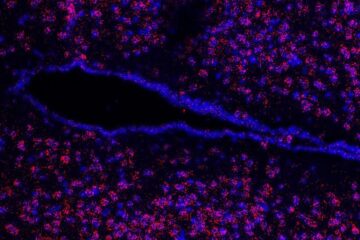Newly identified growth factor promotes stem cell growth, regeneration

The discovery, appearing in the journal Nature Medicine, may help researchers overcome one of the most frustrating barriers to cellular therapy: the fact that stem cells are so few in number and so stubbornly resistant to expansion.
Researchers believe that umbilical cord blood could serve as a universal source of stem cells for all patients who need a stem cell transplant, but the numbers of stem cells in cord blood units are limited, so there is a clinical need to develop a method to expand cord blood stem cells for transplantation purposes. “Unfortunately, there are no soluble growth factors identified to date that have been proven to expand human stem cells for therapeutic purposes,” said John Chute, M.D., a stem cell transplant physician and cell biologist at Duke and senior author of the paper.
Chute, working with Heather Himburg, a post-doctoral fellow in his laboratory, discovered that adding pleiotrophin, a naturally-occurring growth factor, stimulated a ten-fold expansion of stem cells taken from the bone marrow of a mouse.
They also found that pleiotrophin increased the numbers of human cord blood stem cells in culture that were capable of engraftment in immune-deficient mice. When they injected pleiotrophin into mice that had received bone marrow-suppressive radiation, they observed a 10-fold increase in bone marrow stem cells compared to untreated mice. “These results confirmed that pleiotrophin induces stem cell regeneration following injury,” said Chute.
Chute says the finding could lead to broader application of cord blood transplants for the large numbers of patients who do not have an immune-matched donor “Perhaps more importantly, systemic treatment with pleiotrophin may have the potential to accelerate recovery of the blood and immune system in patients undergoing chemotherapy or radiotherapy,” he said.
Given the potency of the effect of pleiotrophin on stem cell expansion, the authors examined whether pleiotrophin provoked blood-forming cells to become malignant. So far, Chute says they have not seen any evidence of cancer in mice up to six months after treatment with pleiotrophin.
The Duke team is already conducting further experiments to determine if pleiotrophin is necessary for normal stem cell growth and development, and Chute says it will be important to conduct additional animal studies before moving into human clinical trials. “At this point, any progress we can make that helps us better understand which biological pathways are activated in stem cells in response to pleiotrophin will help move the discovery forward.”
A grant from the National Institutes of Health supported the study.
Co-authors from Duke who contributed to the work include Pamela Daher, Sarah Meadows, Lauren Russell, Phuong Doan, Jen-Tsan Chi, Alice Salter, William Lento, Tannishtha Reya and Nelson Chao.
Media Contact
More Information:
http://www.duke.eduAll latest news from the category: Life Sciences and Chemistry
Articles and reports from the Life Sciences and chemistry area deal with applied and basic research into modern biology, chemistry and human medicine.
Valuable information can be found on a range of life sciences fields including bacteriology, biochemistry, bionics, bioinformatics, biophysics, biotechnology, genetics, geobotany, human biology, marine biology, microbiology, molecular biology, cellular biology, zoology, bioinorganic chemistry, microchemistry and environmental chemistry.
Newest articles

Roadmap to close the carbon cycle
A holistic approach to reach net-zero carbon emissions across the economy. A major approach to achieving net-zero carbon emissions relies on converting various parts of the economy, such as personal…

Cost-effective, high-capacity, and cyclable lithium-ion battery cathodes
Charge-recharge cycling of lithium-superrich iron oxide, a cost-effective and high-capacity cathode for new-generation lithium-ion batteries, can be greatly improved by doping with readily available mineral elements. The energy capacity and…

New regulator of eating behaviour identified
The rapidly escalating prevalence of overweight and obesity poses a significant medical challenge worldwide. In addition to people’s changing lifestyles, genetic factors also play a key role in the development…





















